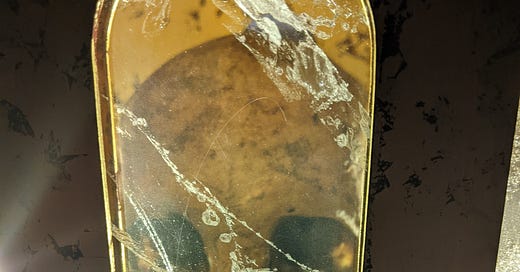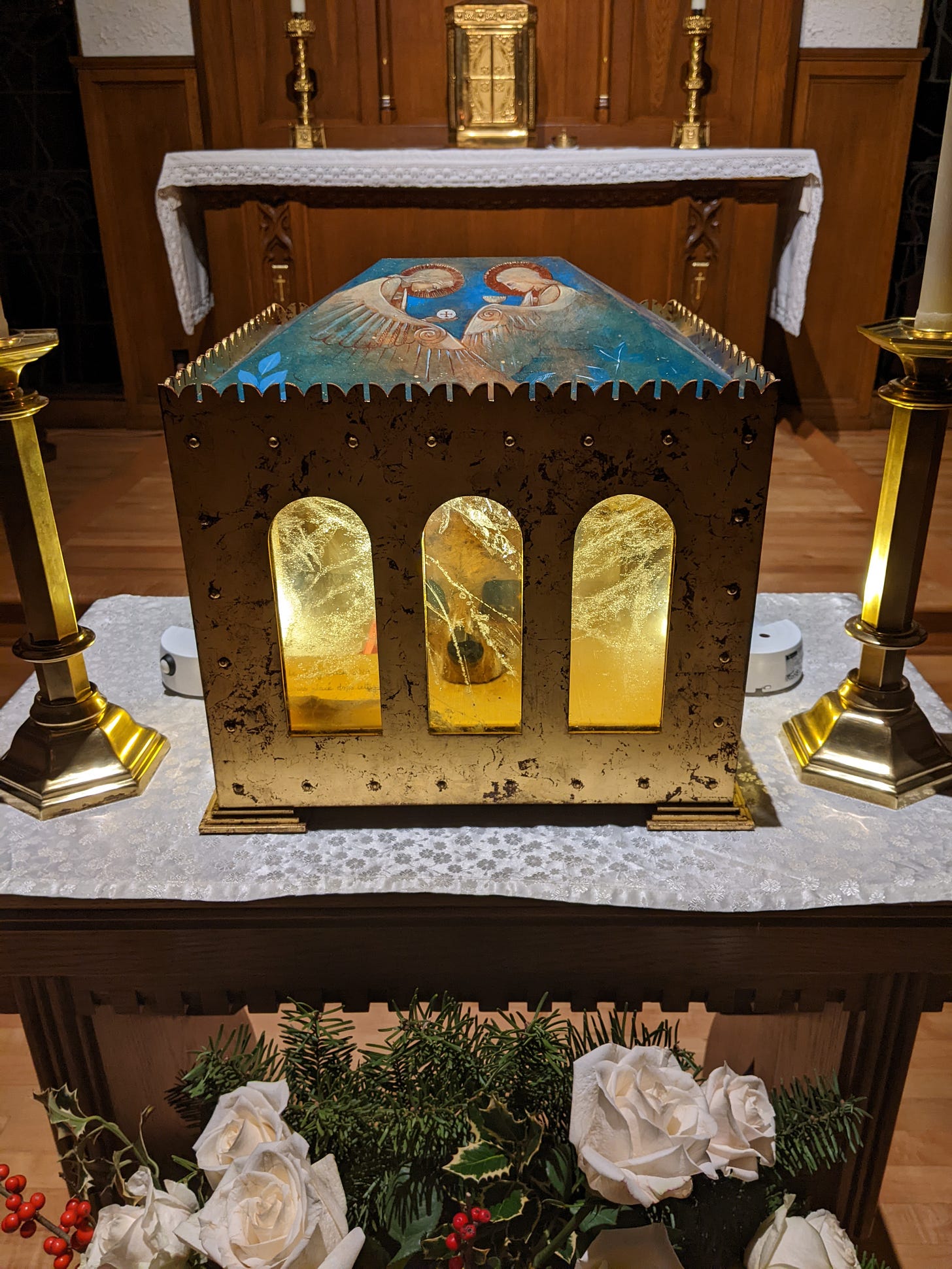Wherefore in memory of them we ought to honor any relics of theirs in a fitting manner: principally their bodies, which were temples, and organs of the Holy Ghost dwelling and operating in them, and are destined to be likened to the body of Christ by the glory of the Resurrection. Hence God Himself fittingly honors such relics by working miracles at their presence. (Summa Theologica, Tertia Pars, q. 25, a. 6)
In December, I had the wonderful opportunity of venerating the relic of St. Thomas Aquinas’ skull sent from France to the East coast of the United States for the 750th Anniversary of his death. The skull was at St. Louis Bertrand in Louisville, KY. I also had the opportunity to carry the relic in a procession during Solemn Vespers. It was truly a beautiful moment to venerate the skull in particular, the same skull he would gently place on the Tabernacle to receive God’s wisdom.
In liturgical celebrations, I am always struck when the feast of St. Thomas Aquinas comes around. Thomas is simply listed as “Priest” in the Liturgy of the Hours. Not a Bishop, not a Pastor, not a Martyr, etc. Just a priest. But what a priest! The Legacy of St. Thomas Aquinas cannot be understated.
Here are a compendium of quotes from various authorities about the Angelic Doctor and his importance for the life of the Church:
While, therefore, We hold that every word of wisdom, every useful thing by whomsoever discovered or planned, ought to be received with a willing and grateful mind, We exhort you, venerable brethren, in all earnestness to restore the golden wisdom of St. Thomas, and to spread it far and wide for the defense and beauty of the Catholic faith, for the good of society, and for the advantage of all the sciences. The wisdom of St. Thomas, We say; for if anything is taken up with too great subtlety by the Scholastic doctors, or too carelessly stated-if there be anything that ill agrees with the discoveries of a later age, or, in a word, improbable in whatever way-it does not enter Our mind to propose that for imitation to Our age. Let carefully selected teachers endeavor to implant the doctrine of Thomas Aquinas in the minds of students, and set forth clearly his solidity and excellence over others. Let the universities already founded or to be founded by you illustrate and defend this doctrine, and use it for the refutation of prevailing errors. But, lest the false for the true or the corrupt for the pure be drunk in, be ye watchful that the doctrine of Thomas be drawn from his own fountains, or at least from those rivulets which, derived from the very fount, have thus far flowed, according to the established agreement of learned men, pure and clear; be careful to guard the minds of youth from those which are said to flow thence, but in reality are gathered from strange and unwholesome streams. (Leo XIII, Aeterni Patries, 31)
He [St. Thomas Aquinas] was one of the two or three giants; one of the two or three greatest men who ever lived; and I should never be surprised if he turned out, quite apart from sanctity, to be the greatest of all…St. Thomas exalted God without lowering Man; he exalted Man without lowering Nature. Therefore, he made a cosmos of common sense; terra vientium; a land of the living. His philosophy, like his theology, is that of common sense. He does not torture the brain with desperate attempts to explain existence by explaining it away. The first steps of his mind are the first steps of any honest mind; just as the first virtues of his creed could be those of any honest peasant. For he, who combined so many things, combined also intellectual subtlety and spiritual simplicity; and the priest who attended the deathbed of this Titan of intellectual energy, whose brain had torn up the roots of the world and pierced every star and split every straw in the whole universe of thought and even of scepticism, said that in listening to the dying man’s confession, he fancied suddenly that he was listening to the first confession of a child of five. (G.K. Chesterton, https://www.chesterton.org/st-thomas-aquinas/.)
…the Church has been justified in consistently proposing Saint Thomas as a master of thought and a model of the right way to do theology. (Pope St. John Paul II, Fides et Ratio, 43.
The valuable work of the scholastics in Holy Scripture is seen in their theological treatises and in their Scripture commentaries; and in this respect the greatest name among them all is St. Thomas of Aquin…Care must be taken, then, that beginners approach the study of the Bible well prepared and furnished; otherwise, just hopes will be frustrated, or, perchance, what is worse, they will unthinkingly risk the danger of error, falling an easy prey to the sophisms and laboured erudition of the Rationalists. The best preparation will be a conscientious application to philosophy and theology under the guidance of St. Thomas of Aquin, and a thorough training therein - as We ourselves have elsewhere pointed out and directed. By this means, both in Biblical studies and in that part of Theology which is called positive, they will pursue the right path and make satisfactory progress. (Leo XIII, Providentissimus Deus)
The life and teaching of St Thomas Aquinas could be summed up in an episode passed down by his ancient biographers. While, as was his wont, the Saint was praying before the Crucifix in the early morning in the chapel of St Nicholas in Naples, Domenico da Caserta, the church sacristan, overheard a conversation. Thomas was anxiously asking whether what he had written on the mysteries of the Christian faith was correct. And the Crucified One answered him: "You have spoken well of me, Thomas. What is your reward to be?". And the answer Thomas gave him was what we too, friends and disciples of Jesus, always want to tell him: "Nothing but Yourself, Lord!" (Pope Benedict XVI, General Audience, June 2, 2010, https://www.vatican.va/content/benedict-xvi/en/audiences/2010/documents/hf_ben-xvi_aud_20100602.html.)
Recommended reading on St. Thomas Aquinas:
St. Thomas Aquinas by G.K. Chesterton
Guide to St. Thomas Aquinas by Josef Pieper
Summa of the Summa by Peter Kreeft
Aeterni Patris by Pope Leo XIII
The Quiet Light: A Novel About St. Thomas Aquinas by Louis de Wohl





